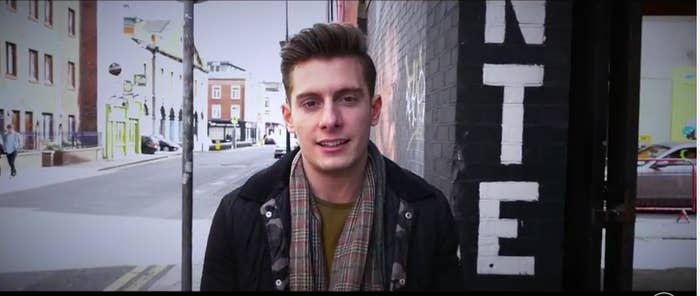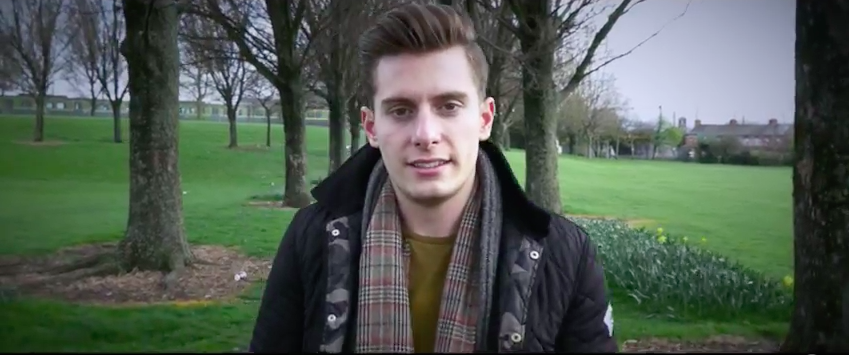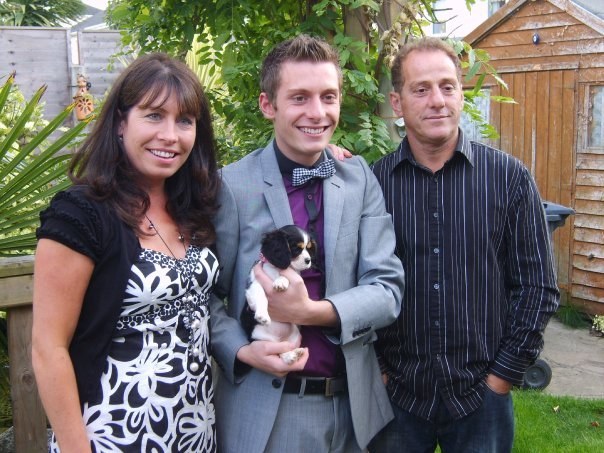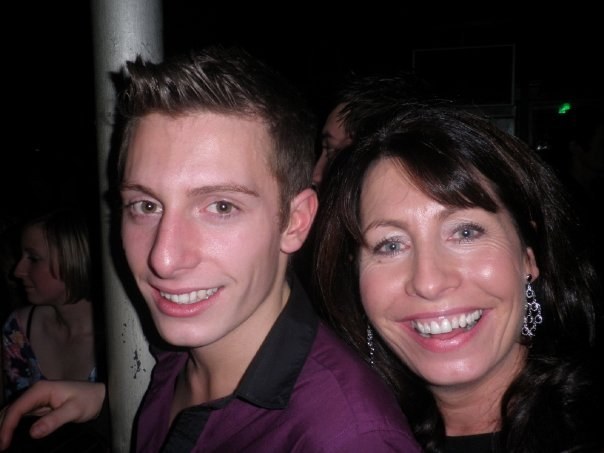When Irish YouTube star and radio DJ Riyadh Khalaf posted this video about same-sex marriage, he had no idea what effect it would have.
View this video on YouTube
Within hours of it going online, he started receiving messages from LGBT viewers moved and inspired by what they had seen.

The footage shows Khalaf, 24, telling the story of his childhood as if it happened to someone else, saying:
He's 7 the first time they tell him he's different.
He's 12 years old when he finds out why: 'fag', 'poof', 'queer', 'sick'... The teenage years bring a bottle to the back of his head.
That boy is me, and his story is the same of millions around the world.
In the video, Khalaf also describes the problems still facing LGBT people in Ireland.
"To take a lover's hand in marriage or simply hold it in public can drown us in fear of attack," he says, adding that a Yes vote would mean "isolated kids will have the same dreams of love as their mother, father, sister, or brother" and that "our love has the same meaning, value, and importance as anyone else's".
The video shows him outside a blood donation clinic to highlight the ban on gay men giving blood, and by The George, Dublin's biggest gay pub and the site of several hate crimes.
He asks people to vote Yes to same-sex marriage "for the man who was brutally beaten in this park and then died".

BuzzFeed News spoke to Khalaf to find out why he felt compelled to make the film.
What response have you had to the video?
Riyadh Khalaf: I've had messages from guys in the UK and Ireland who have seen the video and come out as a result. They're these gorgeous, long messages thanking me for making it, saying, "Watching this video has given me the courage to be who I am and tell my family and friends today." You can just feel the emotion jumping out.
There's been a huge amount of support – like nothing I've ever seen before. Even today a girl in the office came up to me, gave me a big hug, and said, "You have singlehandedly changed my dad's opinion. He never would have gone and voted on something like this because it's not part of this world. But he said, 'Who's that guy you work with? I saw his video.' It's opened his eyes and now he's going to vote and vote Yes."
You filmed in some locations where hate crimes have taken place – why?
RK: I spent three months going over the idea of the video in my head. I realised that if I placed myself in those locations, people can really connect because they're taken to that night where that man was beaten and left for dead.
They're taken to that famous street where the biggest gay bar in the country is, where gay hate crimes happen regularly. These are Irish people, they've been on these streets, they walk down them, so they can then relate it back to their own world.

What was it like for you growing up in Ireland knowing that you're gay?
RK: I had very few role models to look up to. People I could see on the television, or even on the street and think, "OK, I can be both gay and normal – whatever normal means. Or I can be gay and successful. Or I can be gay and hold on to everything I know and love – my friends, my family." I thought that being gay instantly made you an outcast from society, that once you say those words there's no point continuing because your life won't be worth living.
I would often hear kids in the playground saying to me, "You're gay, you're queer," and I didn't know at 9 or 10 what that meant. At 13 or 14 when I found my eyes wandering to my male schoolmates and not the girls, I thought, I can fix this just by forcing myself to look at the girls and appreciate breasts: to try anything I could to mould my brain into a heterosexual mind frame.
No matter how hard I tried, and how many tears I cried by myself in my bedroom every night, I couldn't change myself. And then when I finally accepted myself, I started to grow and heal and began to have the confidence to tell friends and family.
You say in the film you experienced violence as well as verbal bullying…
RK: Yes, in school, some of the kids would pick up on things I wore, or the way I talked, or walked, even the way my hands moved – tiny little indicators. I would be innocently at my locker and get a kick to the side or I'd be pushed into it and my head would whack on it. They'd scream names across a classroom or across the schoolyard. How I got through that was humour – I became the class clown just as a way of distracting the bullies.
You mentioned being hit by a bottle.
RK: One time I was walking home from a friend's New Year's Eve party, I was 17, and I felt this heavy, hard pain at the back of my head – someone had launched a bottle of beer from across the road. They were screaming, "Queer, fag, fuck off," and then they started to follow me down the road. It's night, I'm by myself, and I'm calling 999 and they're not picking up because it's New Year's Eve. I called about five or six times, they're continuing to follow me, and I think, "That's it, I'm dead."
Thankfully I ran down an alleyway and they couldn't follow. But it was that that made me realise, "OK, I can deal with names, but when it gets to the point where I can't walk down the street in my own town without fear of being killed then something's fucking wrong here." That was the point where I got involved in activism and doing everything I could to spread the message.
You said you had no role models – did you mean, as well as famous gay people, visible gay people in happy families?
RK: Exactly. When I was growing up there were no [visible] happy families that happened to be gay: a lesbian couple with a child, a house, and a car, or a gay couple with a nice apartment together who would go to their father-in-law's for Sunday dinner every week. That was never part of something I thought I could have if I came out. I couldn't see a future.
That's how [LGBT] kids think. They believe they're kissing goodbye to a life worth living by coming out, because of the way society paints the picture of lesbian and gay people – that they are lesser. That is why, for me, gay marriage is so much more than just the word marriage or the legal aspect. It's also about normalisation, that, yes, you are the same as them and you can have the same dreams as them.

What was it like coming out as a teenager with a Catholic Irish mum and a Muslim Iraqi dad?
RK: I came out to friends in school aged 16 and that went well, but within three days the entire school knew. This is before my parents knew. I thought, "Dear Lord, it's going to get home before I can say it myself, and they're gonna kick me out."
My mother took it very well but she was afraid of my dad's reaction, so we kept it a secret for a year. Eventually there was a massive argument and my mum turns to me and says, "Riyadh, it's time to tell your dad."
I was crying and he couldn't understand why and I physically couldn't make my mouth produce the words. There was a schoolbook on the table, so I ripped the front page out of it and wrote the words, "I am gay," on that page and slid it across the table to him.
For about 5 or 10 seconds he looked at it, took a deep breath, and came over and gave me a hug and said, "Everything's going to be OK. We'll sort this out." But he wasn't OK with it. He didn't sleep for days. My mum was worried for his wellbeing.
I tried to speak to him but he couldn't even look me in the eye. I said, "One day I want to marry a man, I want to be able to bring my husband to this house and for you to meet him." And then he lost it, screaming and crying saying, "Why me? Why gay? This is wrong." His worry was about how he was going to tell his family back in Iraq and what everyone would think.
But he came round to the idea of you being gay?
RK: Absolutely. I never thought I would see such a change in a human being. He now talks openly with me about boyfriends, he gives me advice about guys, and when I start dating someone he says, "Will you please bring him around because I want to check him over." He's a protective father of a gay son. He's been to Pride three times. He's danced on the stage at The George. He's been to drag shows. He's become an adopted member of the gay community.
The opinion polls for the referendum are improving – are you optimistic?
RK: I am, but then I'm really only seeing and living in the Yes bubble. I'm getting thousands of beautiful comments from people on the Yes side. I've had nasty comments but not as many as I predicted. They're saying I'm trying to manipulate people's minds and skewing the truth, and the video is a disgrace, and quoting sections from the Bible. They're so terrified this vote will go through even though it will have zero effect on their lives. It makes my mind boggle.

